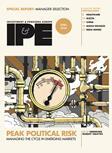Latvia will see the establishment of its first private pension fund this month, following ratification in parliament on July 1 of a new pensions law.
And already, three major companies, including Lat Telekom the Latvian phone communication corporation, have been accepted onto the country's enterprise register, an obligatory requirement for funds before a private pension licence can be granted.
The law permits companies to adopt for the first time a specialist private fund to meet employee benefits, whilst ensuring a regulatory framework of accountancy and licensing procedures to which they must adhere.
It will offer an alternative to the balance sheet and book reserve provisions solely available up until now to Latvian companies for employee retirement. Previously, this involved the shifting of cash to life insurance companies to finally meet pension obligations.
Ganif Bokans, deputy head of the Latvian Insurance Regulator, says: There have also been several further announcements of interest by other companies wanting to take advantage of the new laws." However, Bokans believes it will be another five-seven years before any significant change shapes the Latvian market, as companies wait to see how these new private pension funds have fared.
Rudite Zvirgdina, pension fund administrator at Lat Telekom says their fund could be up and running by the end of July, de-pending on expected further changes in Latvian tax regulation.
"We are just waiting for an announcement by Latvian President Guntis Ulmanis that em-ployers will not have to pay a social tax on pension contributions, before the board takes its final decision," she says.
Through collective agreement between the company and unions, an annual contribution rate of 5% of employee salary will be paid to Lat Telekom's 5,000 workers.
A decision on the company's investment policy has yet to be reached, although Zvirgdina ex-pects a slight shift from the 'conservative' strategy of investing in state bonds and bank deposits for minimal risk, previously em-ployed by the trustees of the company's pension savings."












No comments yet